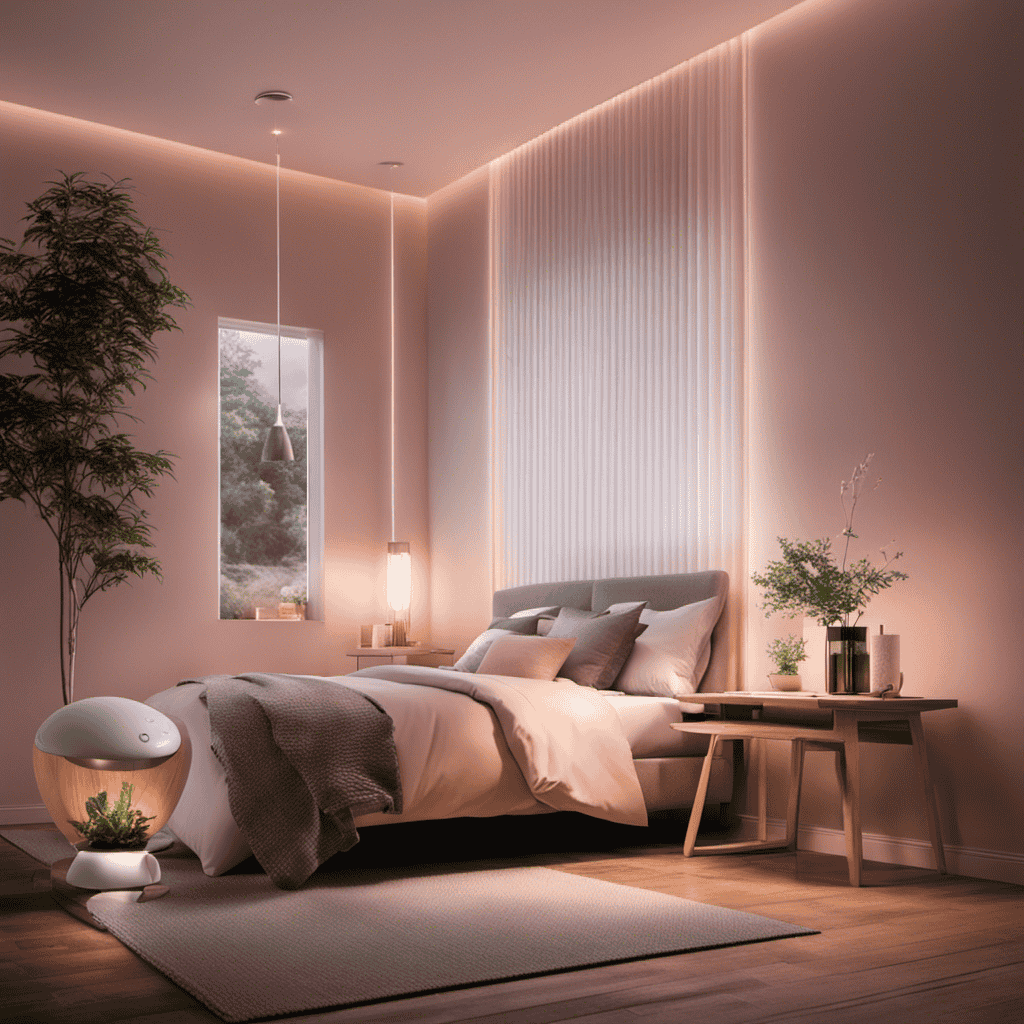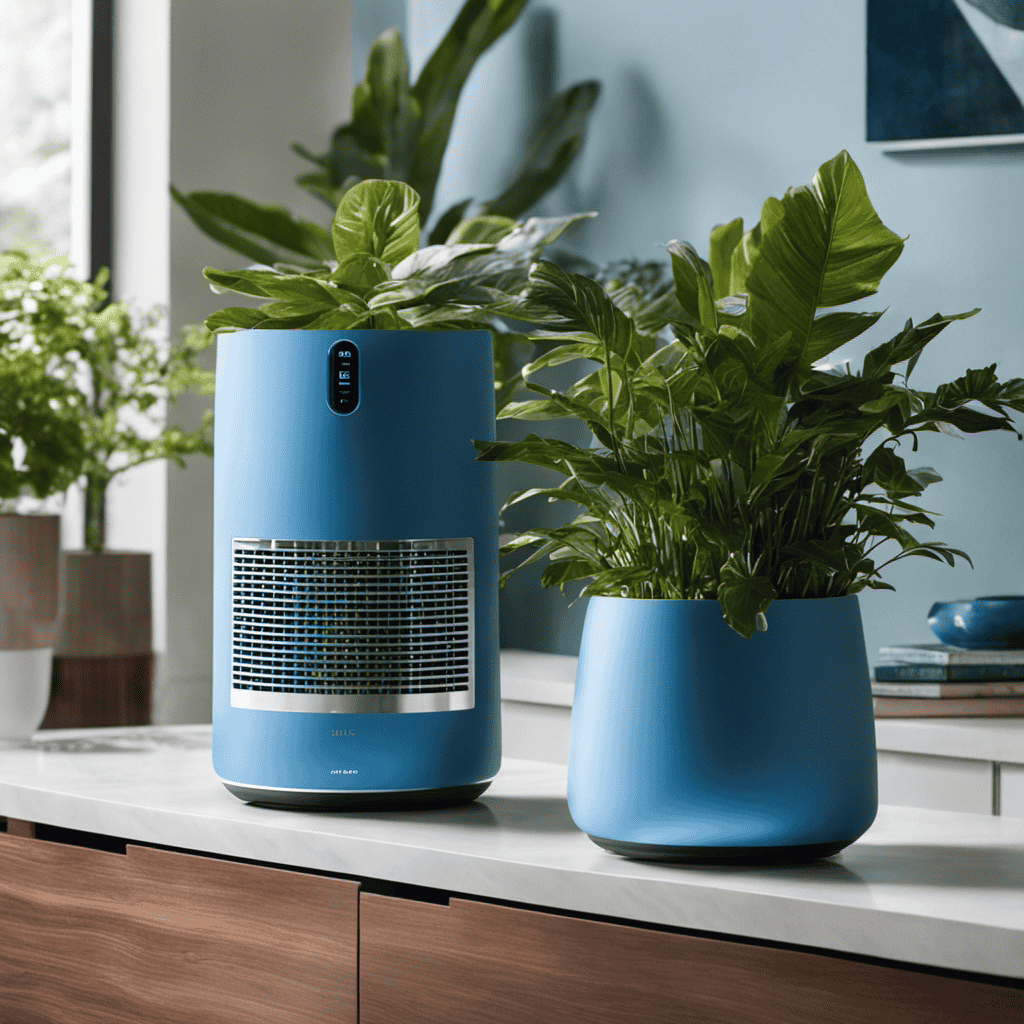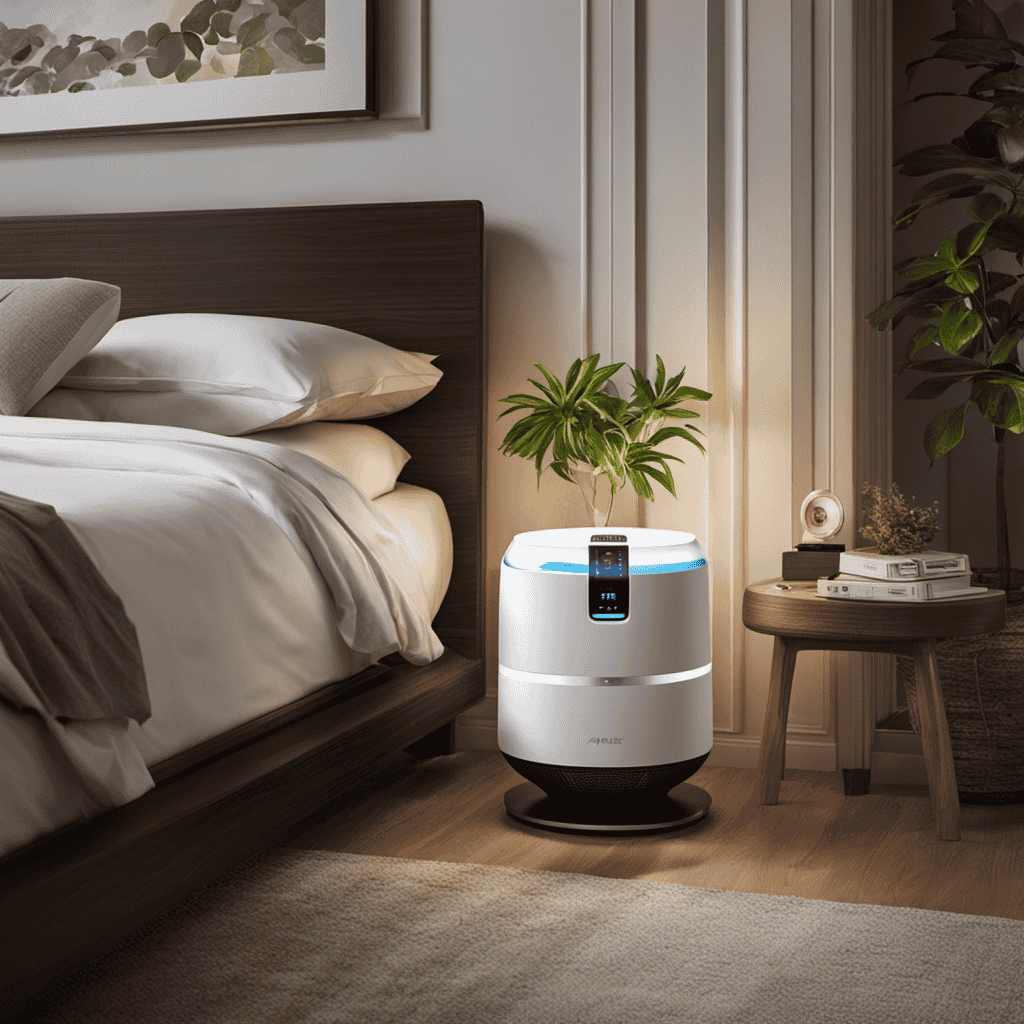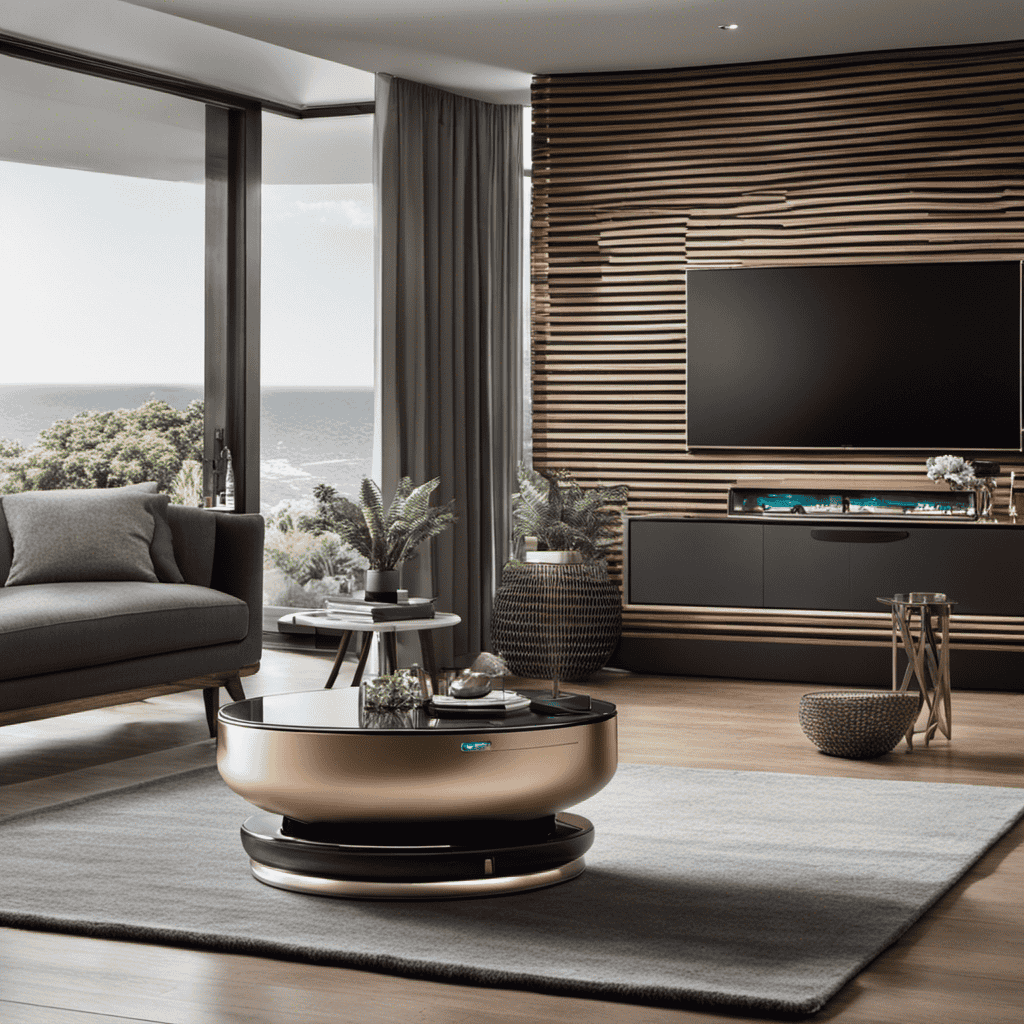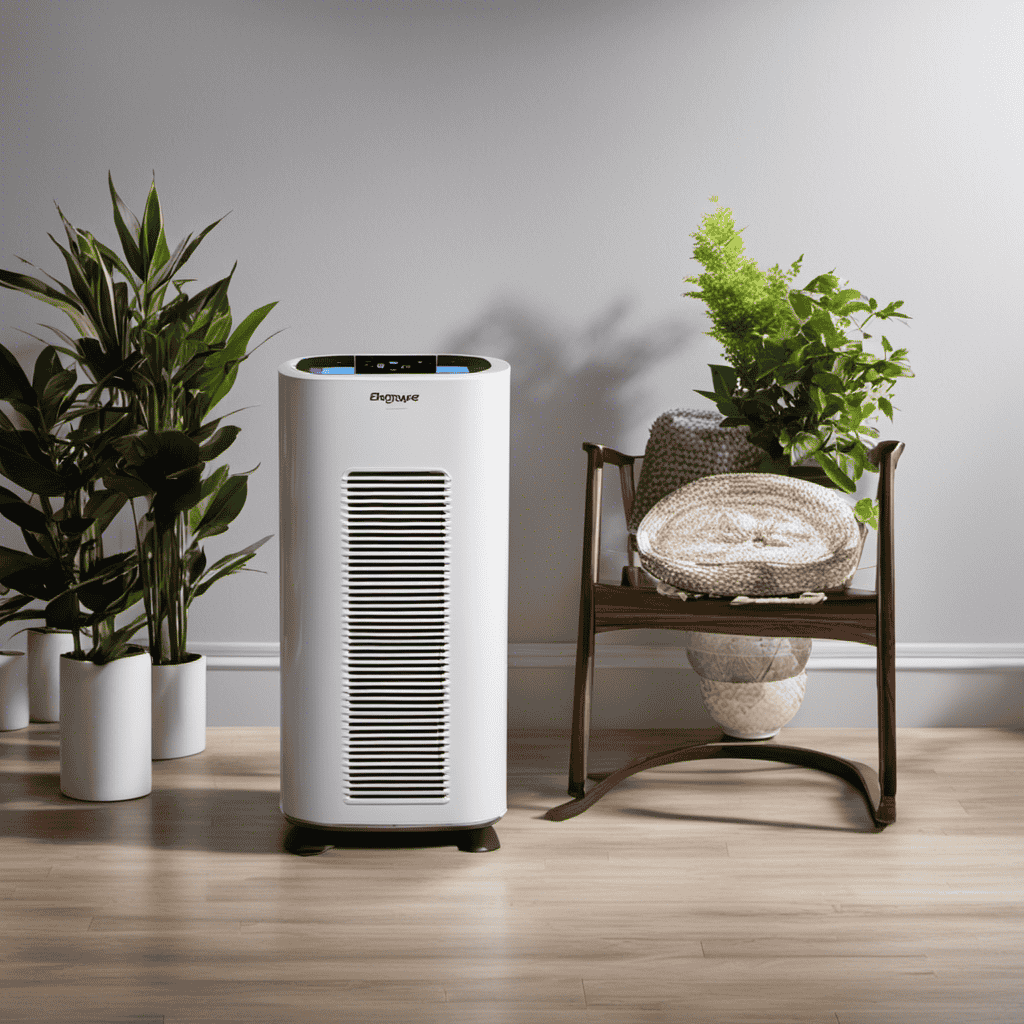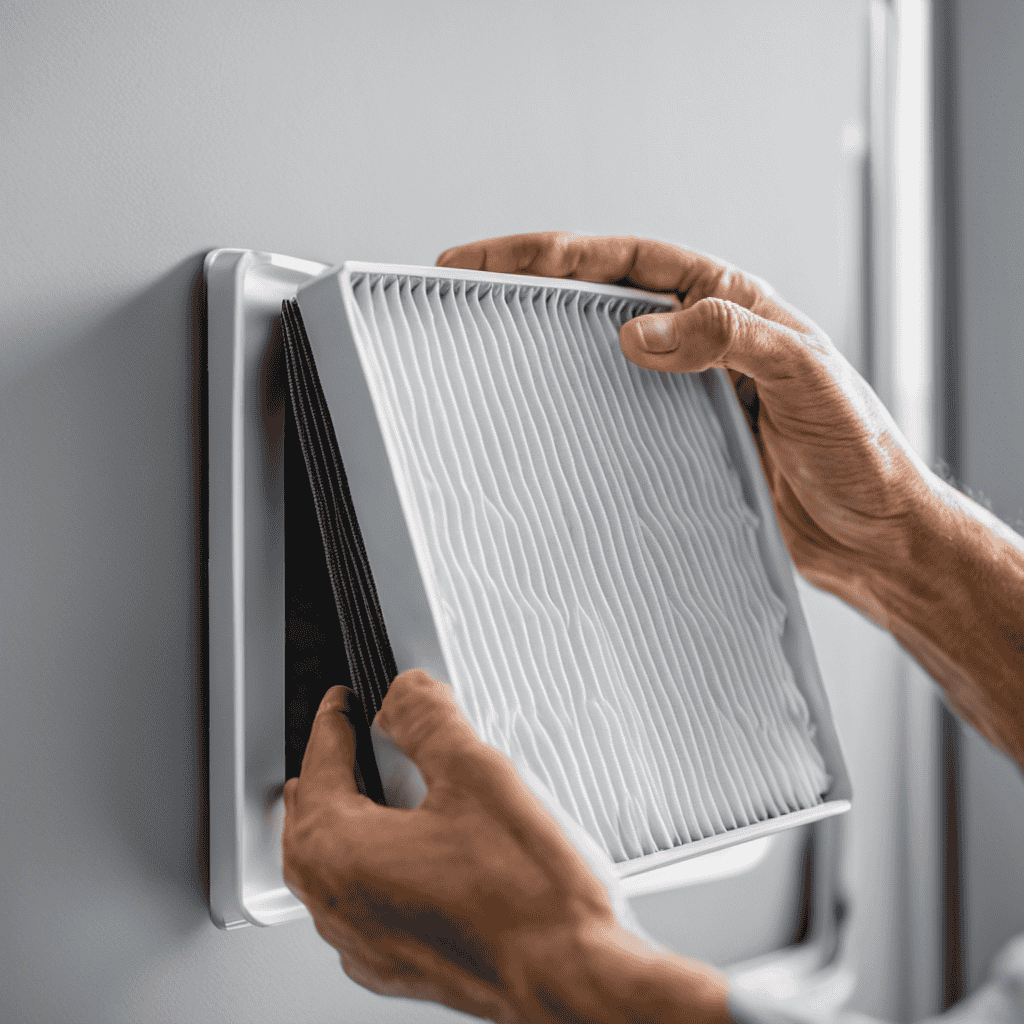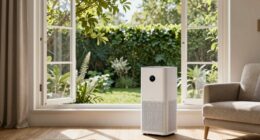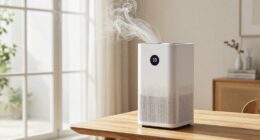As a person with allergies, I have frequently pondered on whether a humidifier or an air purifier is more effective in providing relief. It is ironic how the air we breathe can lead to discomfort.
In this article, I’ll delve into the world of indoor air quality and explore how both humidifiers and air purifiers can help alleviate allergy symptoms. By comparing the benefits and drawbacks of each, we can make an informed decision on which solution is best suited for our individual needs.
Key Takeaways
- High humidity levels promote the growth of mold and dust mites, common indoor allergens.
- Low humidity levels can lead to dryness and irritation of the respiratory tract.
- Humidifiers add moisture to the air, soothing nasal passages and relieving congestion.
- Air purifiers remove airborne allergens from the environment, improving overall air quality.
Understanding Allergies and Indoor Air Quality
Understanding allergies and indoor air quality is crucial when determining whether a humidifier or air purifier is better for allergies.
One important factor to consider is humidity and its impact on respiratory health. High humidity levels can promote the growth of mold and dust mites, which are common indoor allergens. These allergens can trigger symptoms such as coughing, sneezing, and wheezing in individuals with allergies.
On the other hand, low humidity levels can lead to dryness and irritation of the respiratory tract, exacerbating allergy symptoms. An air purifier can help remove allergens from the air, reducing exposure and alleviating symptoms. However, a humidifier can also be beneficial by adding moisture to the air, which can soothe irritated nasal passages and help relieve congestion.
Ultimately, the choice between a humidifier or air purifier depends on the individual’s specific allergy triggers and symptoms.
How Humidifiers Can Help With Allergies
As someone who suffers from allergies, I’ve often wondered about the relationship between humidity and allergens.
It turns out that maintaining the right level of moisture in the air can actually help alleviate allergy symptoms. The benefits of moisture include reducing the presence of common allergens like dust mites and mold, which thrive in dry environments.
Humidity and Allergens
If you’re struggling with allergies, using a humidifier can help alleviate symptoms by reducing the amount of allergens in the air. One of the key benefits of a humidifier is humidity control. Maintaining optimal humidity levels can prevent the growth of mold, which is a common allergen. Mold thrives in damp environments, so by keeping the air adequately humidified, you can discourage its growth. This is especially important for individuals who are sensitive to mold spores. To illustrate the impact of humidity control on allergens, consider the following table:
| Humidity Level | Mold Growth Potential |
|---|---|
| Below 30% | Low |
| 30-50% | Moderate |
| Above 50% | High |
As you can see, maintaining humidity levels between 30-50% can significantly reduce the potential for mold growth and subsequently alleviate allergy symptoms.
Benefits of Moisture
Using a humidifier helps to maintain optimal humidity levels, which can prevent the growth of mold and alleviate allergy symptoms. One of the key benefits of having moisture in the air is its impact on sleep. When the air is too dry, it can cause dryness in the nose and throat, leading to discomfort and difficulty breathing. This can disrupt sleep and leave you feeling tired and groggy in the morning.
By using a humidifier to add moisture to the air, you can create a more comfortable sleep environment. The increased humidity can help soothe dry nasal passages, reduce snoring, and promote better breathing throughout the night. This ultimately leads to a more restful and refreshing sleep.
Transitioning to the next section, let’s explore how humidifiers can further alleviate allergy symptoms.
Alleviating Allergy Symptoms
To alleviate your allergy symptoms, you should consider adding a humidifier to your home. A humidifier can help create a more comfortable and healthy indoor environment by increasing the moisture levels in the air.
Here are three reasons why a humidifier can be beneficial for allergy relief:
-
Moisture helps trap airborne allergens: Dry air can cause airborne allergens like dust mites, pollen, and pet dander to remain suspended in the air for longer periods. By adding moisture to the air, a humidifier can help these allergens settle down, reducing the chances of them being inhaled.
-
Moisture soothes irritated nasal passages: Dry air can irritate the nasal passages, leading to congestion, sneezing, and discomfort. A humidifier can add moisture to the air, providing relief to your nasal passages and reducing allergy symptoms.
-
Moisture prevents dryness-related allergies: Dry air can cause dry skin, dry eyes, and dry throat, making you more susceptible to allergies. A humidifier can help maintain optimal moisture levels, preventing these dryness-related allergies.
The Role of Air Purifiers in Allergy Relief
Air purifiers can help alleviate allergy symptoms by removing airborne allergens from the environment. They are equipped with advanced technology that effectively captures and traps allergens such as pollen, pet dander, dust mites, and mold spores.
This technology typically includes a combination of filters, such as HEPA filters, activated carbon filters, and pre-filters, which work together to remove particles and pollutants from the air.
Unlike humidifiers, which add moisture to the air, air purifiers focus on improving indoor air quality by reducing allergens. While humidifiers can provide relief for dry nasal passages and throat, they do not address the root cause of allergies.
In contrast, air purifiers actively target and remove allergens, making them a more effective solution for allergy sufferers.
Comparing Humidifiers and Air Purifiers for Allergy Relief
When comparing humidifiers and air purifiers, it’s important to consider their impact on allergy relief. Here are some key points to keep in mind:
- Humidifiers can help add moisture to the air, which can soothe dry nasal passages and alleviate allergy symptoms like congestion and irritation.
- Air purifiers, on the other hand, are designed to remove allergens and pollutants from the air, such as dust mites, pet dander, and pollen, which can trigger allergies.
Both humidifiers and air purifiers can be effective in reducing allergy symptoms, but they target different aspects of allergy relief. Humidifiers provide moisture that can ease dryness and congestion, while air purifiers focus on removing allergens from the air to improve overall air quality.
Combining the use of a humidifier and air purifier can provide comprehensive allergy relief by addressing both dryness and airborne allergens.
In the next section, we will explore the specific benefits of using a humidifier for allergies.
Benefits of Using a Humidifier for Allergies
If you’re looking for a way to alleviate allergy symptoms, using a humidifier can provide relief by increasing moisture in the air. This can be particularly beneficial for individuals who suffer from dry nasal passages, irritated throat, and itchy eyes.
By adding moisture to the air, a humidifier helps to soothe these symptoms and create a more comfortable environment. Additionally, a humidifier can help to reduce congestion and improve breathing, making it easier for allergy sufferers to breathe.
It’s important to note that a humidifier should be used in moderation to avoid excessive humidity, which can promote the growth of mold and dust mites. However, when used correctly, a humidifier can be an effective tool in alleviating allergy symptoms.
Now, let’s explore the advantages of using an air purifier for allergies.
Advantages of Using an Air Purifier for Allergies
When it comes to addressing allergies, using an air purifier can be highly effective in reducing allergy symptoms.
Air purifiers work by filtering out allergens such as dust, pollen, pet dander, and mold spores from the air, which can significantly improve indoor air quality.
Studies have shown that using an air purifier can lead to a reduction in symptoms such as sneezing, coughing, and itchy eyes, making it a valuable tool for allergy sufferers.
Air Purifier Effectiveness
The air purifier can significantly reduce airborne allergens, making it an effective solution for allergies. Here are some key points to consider regarding air purifier effectiveness:
-
Regular air purifier maintenance is crucial to ensure optimal performance. This includes changing filters as recommended by the manufacturer and cleaning the unit regularly.
-
Air purifiers are designed to capture various indoor air pollutants such as dust, pet dander, pollen, and mold spores. They use filters to trap these particles and prevent them from circulating in the air.
-
HEPA (High-Efficiency Particulate Air) filters are highly effective in capturing even the smallest allergen particles, with an efficiency rate of 99.97%.
-
Some air purifiers also feature additional technologies like activated carbon filters to remove odors, and UV-C light to kill germs and bacteria.
Allergy Symptom Reduction
Regular maintenance of an air purifier is essential to ensure it effectively reduces allergy symptoms. Air purifiers work by trapping and removing allergens such as dust, pollen, pet dander, and mold spores from the air we breathe. However, if not properly maintained, they can become less efficient and fail to provide the desired relief. To illustrate the importance of regular maintenance, let’s take a look at the following table:
| Maintenance Task | Frequency | Benefits |
|---|---|---|
| Replace filters | Every 3-6 months | Ensures optimal filtration |
| Clean exterior | Monthly | Prevents buildup of dirt and dust |
| Check for leaks | Quarterly | Maintains effective performance |
| Vacuum intake vents | Weekly | Improves air flow and efficiency |
Factors to Consider When Choosing Between a Humidifier and Air Purifier
If you’re deciding between a humidifier and air purifier, there are several factors to consider. Here are some key points to help you make an informed decision:
-
Allergen Removal: Air purifiers are designed to capture and eliminate allergens, such as dust mites, pollen, and pet dander, from the air. Humidifiers, on the other hand, do not directly remove allergens but can help alleviate symptoms by moisturizing the air.
-
Humidity Control: Humidifiers are great for increasing humidity levels in dry environments, which can soothe irritated nasal passages and prevent dry skin. Air purifiers do not have this capability.
-
Noise Level: Consider the noise level of the device, especially if you plan on using it in your bedroom. Air purifiers can generate white noise, which some people find soothing for sleep, while humidifiers may produce a gurgling or dripping sound.
Considering these factors, it’s important to choose the right device to address your specific needs.
Now, let’s explore how a humidifier can help address common allergy triggers.
Addressing Common Allergy Triggers With a Humidifier
When it comes to addressing common allergy triggers and reducing indoor allergens, a humidifier can be a helpful tool. By increasing the moisture in the air, a humidifier can alleviate symptoms caused by dryness, such as dry skin and throat irritation. Additionally, maintaining proper humidity levels can help reduce dust mites and mold growth, which are common allergens.
To further enhance the effectiveness of a humidifier in reducing indoor allergens, it is important to follow certain practices. Regularly cleaning and disinfecting the humidifier is crucial to prevent the growth of bacteria and mold. Using distilled water instead of tap water can also minimize mineral build-up and airborne contaminants. Additionally, keeping the humidity levels between 30% and 50% can create an environment that is less favorable for allergens to thrive.
To summarize, a humidifier can be a valuable tool in addressing common allergy triggers and reducing indoor allergens, but it is essential to properly maintain and use it to maximize its benefits.
| Tips for Reducing Indoor Allergens with a Humidifier |
|---|
| Clean and disinfect the humidifier regularly |
| Use distilled water instead of tap water |
| Maintain humidity levels between 30% and 50% |
| Monitor and control humidity levels consistently |
Eliminating Allergens With the Help of an Air Purifier
When it comes to eliminating allergens and improving indoor air quality, air purifiers are highly effective.
These devices work by filtering out particles such as dust, pollen, pet dander, and mold spores, which can trigger allergies and respiratory issues.
The benefits of clean air extend beyond allergy relief, as it can also promote better sleep, reduce asthma symptoms, and improve overall respiratory health.
Air Purifier Effectiveness
The air purifier is more effective at removing allergens from the air than the humidifier. Air purifiers utilize advanced technology to effectively filter out allergens, such as pollen, dust mites, pet dander, and mold spores. They often feature HEPA (High-Efficiency Particulate Air) filters, which can capture particles as small as 0.3 microns with an efficiency of 99.97%.
This ensures that the air you breathe is clean and free from allergens. Additionally, air purifiers require minimal maintenance. Regularly replacing the filters and cleaning the unit can help maintain its effectiveness. Some models even come with filter replacement indicators, making maintenance even easier.
Benefits of Clean Air
Having clean air in your indoor environment can greatly improve your overall health and well-being. Clean air benefits include reducing the risk of respiratory problems, allergies, and asthma. By improving air quality, you can minimize the presence of airborne pollutants such as dust, pollen, pet dander, and mold spores. These pollutants can trigger allergic reactions and respiratory issues, causing discomfort and impacting your daily life.
Clean air also promotes better sleep, enhances concentration and productivity, and boosts your immune system. To achieve clean air, it is important to implement strategies such as proper ventilation, regular cleaning and maintenance, and the use of air purifiers or humidifiers. These devices can effectively remove pollutants and maintain optimal humidity levels, ensuring a healthier indoor environment for you and your family.
Best Practices for Using a Humidifier for Allergy Relief
Using a humidifier can be beneficial for allergy relief. It adds moisture to the air, reducing symptoms like dryness and congestion. Here are some best practices to maximize its effectiveness:
- Regularly clean and maintain your humidifier to prevent mold and bacteria growth. These can worsen allergy symptoms.
- Use distilled or filtered water to avoid spreading allergens like pollen and dust.
- Set your humidifier to maintain a humidity level between 30-50%. Excessively high humidity can create a breeding ground for mold and dust mites.
By following these practices, you can ensure that your humidifier provides the best allergy relief possible.
However, it’s important to note that a humidifier alone may not eliminate all allergens from your home. In the next section, we will explore additional tips for maximizing the effectiveness of an air purifier for comprehensive allergy relief.
Tips for Maximizing the Effectiveness of an Air Purifier for Allergies
For maximum effectiveness, make sure to regularly clean and replace the filters in your air purifier. By doing so, you can ensure that your air purifier is functioning at its best and effectively reducing allergy symptoms.
Air purifiers work by filtering out airborne allergens, such as pollen, dust mites, and pet dander, which can trigger allergies and asthma symptoms. Over time, these filters can become clogged with particles, reducing their efficiency. Cleaning or replacing the filters on a regular basis will help to maintain the air purifier’s performance and prolong its lifespan.
Additionally, it is important to place the air purifier in the room where you spend the most time, such as the bedroom, to maximize its impact on reducing allergy symptoms.
Potential Drawbacks of Using a Humidifier for Allergies
The potential drawbacks of a humidifier for allergies include an increased risk of mold and dust mite growth if the humidity levels are not properly controlled. This can have long-term effects on your health and make your allergies worse. Here are some potential drawbacks to consider:
-
Mold growth: Excessive moisture in the air can create the perfect breeding ground for mold. If not properly maintained, a humidifier can release mold spores into the air, leading to respiratory issues and allergies.
-
Dust mite growth: Dust mites thrive in humid environments. If the humidity levels are too high, they can multiply and trigger allergic reactions, such as sneezing, coughing, and itching.
-
Increased allergen exposure: Humidifiers can spread allergens like pollen and pet dander throughout the air. This can worsen allergies and make your symptoms more severe.
It’s essential to monitor and control humidity levels when using a humidifier to avoid these potential drawbacks and ensure a healthy indoor environment.
Potential Drawbacks of Using an Air Purifier for Allergies
To ensure optimal effectiveness, you should regularly clean and replace the filters in an air purifier for allergies. Proper air purifier maintenance is crucial for its performance in eliminating allergens and improving indoor air quality.
Filters in air purifiers trap particles like dust, pollen, pet dander, and mold spores, preventing them from circulating in the air. Over time, these filters can become clogged, reducing the purifier’s efficiency. By cleaning or replacing the filters according to the manufacturer’s instructions, you can ensure that your air purifier continues to effectively remove allergens from the air.
While the cost of air purifiers and replacement filters may vary depending on the brand and model, the benefits of clean air and reduced allergy symptoms make it a worthwhile investment.
Transitioning into the subsequent section about real-life experiences: user testimonials on humidifiers vs. air purifiers for allergies, it is important to consider the experiences and perspectives of individuals who have used both types of devices.
Real-Life Experiences: User Testimonials on Humidifiers Vs. Air Purifiers for Allergies
When it comes to finding relief from allergies, it can be tough to decide between using a humidifier or an air purifier.
In this discussion, we will explore the effectiveness of both options, taking into account user preference and satisfaction.
Additionally, we will delve into personal experiences to see if allergies improved before and after using either a humidifier or an air purifier.
Humidifier Vs. Purifier Effectiveness
You might be wondering which is more effective for allergies: a humidifier or an air purifier. When it comes to managing airborne allergens and promoting respiratory health, both devices have their benefits. Here’s what you need to know:
-
Humidifiers:
-
Increase moisture levels in the air, which can help alleviate dryness and irritation in the respiratory system.
-
Can provide relief from symptoms like coughing, congestion, and sore throat caused by dry air.
-
However, they may not be effective in removing allergens like dust mites, pollen, and pet dander from the air.
-
Air Purifiers:
-
Filter and trap airborne allergens, reducing their presence in the indoor environment.
-
Can effectively remove common allergens like dust, mold spores, and pet dander.
-
Help improve indoor air quality and minimize respiratory issues caused by allergen exposure.
Ultimately, the choice between a humidifier and an air purifier depends on your specific needs and the type of allergens you are trying to manage.
User Preference and Satisfaction
In terms of user satisfaction and personal preference, both humidifiers and air purifiers have their own advantages. Some individuals may find that a humidifier provides them with relief from dryness and congestion, leading to improved comfort and sleep quality. On the other hand, others may prefer air purifiers as they are specifically designed to remove allergens and pollutants from the air, reducing the triggers for allergies.
The choice between the two ultimately depends on individual needs and preferences. It is important to consider factors such as the severity of allergies, the climate in which one lives, and the specific triggers that affect them. By considering these factors, individuals can make an informed decision about whether a humidifier or an air purifier would be more suitable for their allergies.
Now, let’s explore the impact of allergies before and after using humidifiers and air purifiers.
Allergies Before and After
After using humidifiers or air purifiers, individuals may notice a decrease in their allergy symptoms. These devices can help prevent allergies by removing allergens from the air, providing long term relief.
Here are three reasons why using humidifiers or air purifiers can be beneficial for allergy sufferers:
-
Reduction of allergens: Both humidifiers and air purifiers can effectively remove common allergens such as pollen, dust mites, and pet dander from the air. This can significantly decrease the chances of an allergic reaction.
-
Improved air quality: Humidifiers add moisture to the air, which can help soothe irritated nasal passages and reduce congestion. Air purifiers, on the other hand, filter out harmful particles, improving overall air quality.
-
Prevention of respiratory issues: By reducing allergens and improving air quality, humidifiers and air purifiers can help prevent respiratory issues such as asthma attacks and allergic rhinitis.
Using a combination of humidifiers and air purifiers can provide individuals with long term relief from their allergy symptoms, creating a healthier and more comfortable living environment.
Making an Informed Decision: Choosing the Right Solution for Your Allergies
When it comes to choosing the right solution for your allergies, it’s important to consider whether a humidifier or an air purifier would be more beneficial.
Both options have their own advantages and can help manage allergy symptoms effectively.
A humidifier adds moisture to the air, which can alleviate dryness and irritation in the nasal passages, throat, and skin.
On the other hand, an air purifier filters out airborne allergens such as dust, pollen, pet dander, and mold spores, reducing the overall allergen load in the room.
To make an informed decision, it’s crucial to assess your specific allergy triggers and symptoms.
For example, if you primarily suffer from dryness and congestion, a humidifier may be more helpful. However, if your allergies are triggered by airborne particles, an air purifier might be a better choice.
What is the best option for relieving allergy symptoms: a humidifier or an air purifier?
When it comes to relieving allergy symptoms, the choice between a humidifier vs air purifier depends on the specific triggers. A humidifier adds moisture to the air, soothing dryness and irritation. An air purifier, on the other hand, filters out allergens and airborne irritants. Both can be effective in different ways.
Frequently Asked Questions
Can a Humidifier Completely Eliminate Allergies?
A humidifier alone cannot completely eliminate allergies. While it can provide temporary relief by adding moisture to the air, long-term benefits and allergy prevention require a combination of measures, including air purifiers, proper cleaning, and allergen avoidance.
What Are the Long-Term Effects of Using an Air Purifier for Allergies?
Using an air purifier for allergies can have long-term benefits. It’s effective in reducing allergens, but comparing it to a humidifier is like comparing apples and oranges. Each has its own unique advantages.
Can a Humidifier Worsen Mold Allergies?
Using a humidifier may worsen mold allergies as it creates a moist environment which promotes mold growth. However, an air purifier can help in mold prevention by filtering out airborne mold spores, improving indoor air quality.
How Often Should I Clean My Air Purifier to Ensure Its Effectiveness Against Allergies?
To ensure my air purifier effectively combats allergies, I clean it every 2-3 months. I also follow best practices for maintenance, such as replacing filters regularly. Choosing the right air purifier for allergies involves considering factors like room size and filtration technology.
Can Using Both a Humidifier and an Air Purifier Together Provide Better Allergy Relief?
Using both a humidifier and an air purifier together can provide better allergy relief. While a humidifier helps maintain optimal humidity levels, an air purifier filters out allergens, creating a cleaner and more comfortable indoor environment.
Conclusion
After carefully examining the benefits and drawbacks of both humidifiers and air purifiers for allergies, it is clear that there is no one-size-fits-all solution.
While humidifiers can provide relief by adding moisture to the air, air purifiers are effective at removing allergens and pollutants.
Ultimately, the choice between the two will depend on individual needs and preferences.
As the saying goes, ‘Different strokes for different folks.’
It is important to consider factors such as the specific allergens involved and the overall air quality in your home before making a decision.
